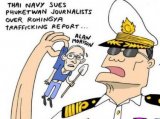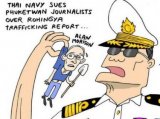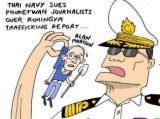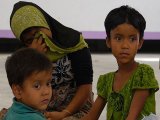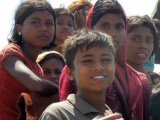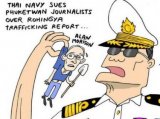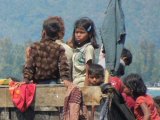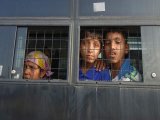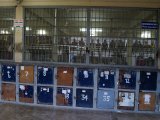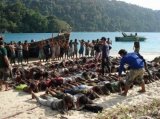BANGKOK: The government of Thailand made little progress over the past year in resolving persistent human rights problems in the country, Human Rights Watch said today in its World Report 2014.
''Prime Minister Yingluck Shinawatra's promises to bring national reconciliation and justice to victims of the 2010 violence have fallen flat,'' said Brad Adams, Asia director at Human Rights Watch.
''By pushing for a blanket amnesty for serious abusers on all sides, the government has not promoted reconciliation, but instead intensified Thailand's political divide.''
In the 667-page world report, its 24th edition, Human Rights Watch reviews human rights practices in more than 90 countries. Syria's widespread killings of civilians elicited horror but few steps by world leaders to stop it, Human Rights Watch said.
A reinvigorated doctrine of ''responsibility to protect'' seems to have prevented some mass atrocities in Africa. Majorities in power in Egypt and other countries have suppressed dissent and minority rights.
And Edward Snowden's revelations about US surveillance programs reverberated around the globe.
The government's failure to provide accountability for past abuses has spurred ongoing violence, Human Rights Watch said. On November 1, 2013, the House of Representatives passed a broad-based amnesty bill covering offenses by protesters and authorities from 2004 to 2011, and individuals convicted of corruption after the 2006 coup.
Anti-amnesty protests in Bangkok and elsewhere escalated to more than 100,000 people, and continued after the Senate rejected the bill on November 11.
Street battles among protesters led by the People's Democratic Reform Committee (PDRC), which vowed to topple the government, pro-government groups, and the police between November 30 and December 3 left at least four dead and more than 200 wounded.
Opposition groups targeted journalists they considered supportive of the government. On November 25, demonstrators assaulted foreign journalist Nick Nostitz after a PDRC speaker told the crowd he was pro-government. Politicians from the opposition Democrat Party on December 1 led thousands of PDRC supporters to six TV stations to pressure them to broadcast only antigovernment programs.
The number of arrests and convictions for lese majeste (insulting the monarchy) has declined since Prime Minister Yingluck Shinawatra entered office in 2011, but authorities continue to use the law, for instance the Computer Crimes Act, to suppress free speech and prosecute critics.
People charged with lese majeste offenses are routinely denied bail and often remain in prison for many months awaiting trial. In most cases, convictions result in harsh sentences.
A criminal defamation case brought by the navy against reporters for a story on corruption by naval personnel could have huge implications for investigative journalism in the country.
''Increased restrictions on free speech and intimidation of the media show that freedom of expression hangs by a thin thread in Thailand,'' Adams said.
The military and police operated with impunity in Thailand's southern border provinces, as they have since the separatist insurgency erupted in 2004.
Not a single member of the security forces has been criminally prosecuted for serious rights abuses in Pattani, Narathiwat, and Yala provinces.
Separatist insurgents point to government abuses to recruit new members and justify their campaign of terror targeting officials and civilians, which has claimed more than 5000 lives.
While hosting large numbers of asylum seekers and refugees, Thailand in some cases violated its international legal obligations not to return people to countries where they were likely to face persecution, Human Rights Watch said.
The government considers all ethnic Rohingya arriving by sea to be illegal migrants, and regularly intercepts them. More than 2000 Rohingya were detained in poor conditions by Thai immigration.
Networks of human traffickers preying on Rohingya seeking to travel to Malaysia operated with impunity in Thailand.
''Prime Minister Yingluck needs to demonstrate leadership and reverse the government's course on human rights,'' Adams said. ''She should urgently undertake concrete and systematic measures to end abuses, stop censorship, and eliminate impunity.''
To read Human Rights Watch's World Report 2014 chapter on Thailand, please visit:
https://www.hrw.org/world-report/2014/country-chapters/thailand
''Prime Minister Yingluck Shinawatra's promises to bring national reconciliation and justice to victims of the 2010 violence have fallen flat,'' said Brad Adams, Asia director at Human Rights Watch.
''By pushing for a blanket amnesty for serious abusers on all sides, the government has not promoted reconciliation, but instead intensified Thailand's political divide.''
In the 667-page world report, its 24th edition, Human Rights Watch reviews human rights practices in more than 90 countries. Syria's widespread killings of civilians elicited horror but few steps by world leaders to stop it, Human Rights Watch said.
A reinvigorated doctrine of ''responsibility to protect'' seems to have prevented some mass atrocities in Africa. Majorities in power in Egypt and other countries have suppressed dissent and minority rights.
And Edward Snowden's revelations about US surveillance programs reverberated around the globe.
The government's failure to provide accountability for past abuses has spurred ongoing violence, Human Rights Watch said. On November 1, 2013, the House of Representatives passed a broad-based amnesty bill covering offenses by protesters and authorities from 2004 to 2011, and individuals convicted of corruption after the 2006 coup.
Anti-amnesty protests in Bangkok and elsewhere escalated to more than 100,000 people, and continued after the Senate rejected the bill on November 11.
Street battles among protesters led by the People's Democratic Reform Committee (PDRC), which vowed to topple the government, pro-government groups, and the police between November 30 and December 3 left at least four dead and more than 200 wounded.
Opposition groups targeted journalists they considered supportive of the government. On November 25, demonstrators assaulted foreign journalist Nick Nostitz after a PDRC speaker told the crowd he was pro-government. Politicians from the opposition Democrat Party on December 1 led thousands of PDRC supporters to six TV stations to pressure them to broadcast only antigovernment programs.
The number of arrests and convictions for lese majeste (insulting the monarchy) has declined since Prime Minister Yingluck Shinawatra entered office in 2011, but authorities continue to use the law, for instance the Computer Crimes Act, to suppress free speech and prosecute critics.
People charged with lese majeste offenses are routinely denied bail and often remain in prison for many months awaiting trial. In most cases, convictions result in harsh sentences.
A criminal defamation case brought by the navy against reporters for a story on corruption by naval personnel could have huge implications for investigative journalism in the country.
''Increased restrictions on free speech and intimidation of the media show that freedom of expression hangs by a thin thread in Thailand,'' Adams said.
The military and police operated with impunity in Thailand's southern border provinces, as they have since the separatist insurgency erupted in 2004.
Not a single member of the security forces has been criminally prosecuted for serious rights abuses in Pattani, Narathiwat, and Yala provinces.
Separatist insurgents point to government abuses to recruit new members and justify their campaign of terror targeting officials and civilians, which has claimed more than 5000 lives.
While hosting large numbers of asylum seekers and refugees, Thailand in some cases violated its international legal obligations not to return people to countries where they were likely to face persecution, Human Rights Watch said.
The government considers all ethnic Rohingya arriving by sea to be illegal migrants, and regularly intercepts them. More than 2000 Rohingya were detained in poor conditions by Thai immigration.
Networks of human traffickers preying on Rohingya seeking to travel to Malaysia operated with impunity in Thailand.
''Prime Minister Yingluck needs to demonstrate leadership and reverse the government's course on human rights,'' Adams said. ''She should urgently undertake concrete and systematic measures to end abuses, stop censorship, and eliminate impunity.''
To read Human Rights Watch's World Report 2014 chapter on Thailand, please visit:
https://www.hrw.org/world-report/2014/country-chapters/thailand



